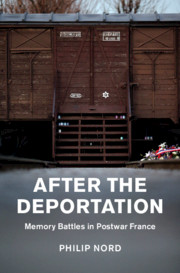Book contents
- After the Deportation
- Studies in the Social and Cultural History of Modern Warfare
- After the Deportation
- Copyright page
- Dedication
- Contents
- Figures
- Acknowledgments
- Abbreviations
- Introduction
- Part I Heroes and Martyrs
- Part II Shoah
- 7 Holocaust
- 8 The Teaching of Contempt
- 9 Witnesses
- 10 Generation
- 11 “The Return of the Repressed”
- 12 Shoah
- Epilogue and Conclusion
- Notes
- Index
8 - The Teaching of Contempt
from Part II - Shoah
Published online by Cambridge University Press: 16 November 2020
- After the Deportation
- Studies in the Social and Cultural History of Modern Warfare
- After the Deportation
- Copyright page
- Dedication
- Contents
- Figures
- Acknowledgments
- Abbreviations
- Introduction
- Part I Heroes and Martyrs
- Part II Shoah
- 7 Holocaust
- 8 The Teaching of Contempt
- 9 Witnesses
- 10 Generation
- 11 “The Return of the Repressed”
- 12 Shoah
- Epilogue and Conclusion
- Notes
- Index
Summary
Catholics engaged in dialogue with Jews, and the Jews answered back, sometime in challenging, acerbic tones, as did Jules Isaac, a French Jew who, like Schneersohn, had survived the war in hiding. Isaac blamed the genocide of the Jews in part on Christian anti-Semitic teachings, l’enseignement du mépris as he called it, and there were elements in the Church willing to reflect on Isaac’s accusations. Isaac met two popes, Pius XII and John XXIII, and his dialogue with the latter proved fruitful, playing a part in the crafting of Nostra Aetate (1965), a Vatican II declaration that reformulated, among other things, Church doctrine on the Jews.
- Type
- Chapter
- Information
- After the DeportationMemory Battles in Postwar France, pp. 264 - 286Publisher: Cambridge University PressPrint publication year: 2020

